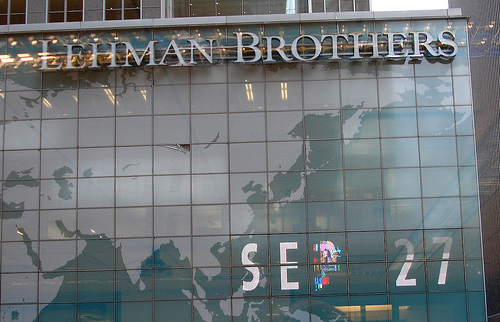Its Dead Jim
In his column today Robert J. Samuelson lays out why more regulations really aren’t needed.
What’s really happened is that Wall Street’s business model has collapsed.
If this is true, then there is nothing to regulate. The horses have already run off, closing the barn door now is not going to help.
Samuelson continues,
Greed and fear, which routinely govern financial markets, have seeded this global crisis. Just when it will end isn’t clear. What is clear is that its origins lie in the ways that Wall Street — the giant investment houses, brokerage firms, hedge funds and “private equity” firms — has changed since 1980. Its present business model has three basic components.
Given that this is an election year everyone is busy pointing fingers. Its the Democrats fault, its the Republicans fault. Clinton! Bush! Reagan! The reality is that there is plenty of blame to go around for just about everyone to have a nice big serving.
In 1999 the Glass-Steagall Act was repealed. Here is the Wikipedia entry,
The Glass-Steagall Act of 1933 established the Federal Deposit Insurance Corporation (FDIC) in the United States and included banking reforms, some of which were designed to control speculation.[citation needed] Some provisions such as Regulation Q that allowed the Federal Reserve to regulate interest rates in savings accounts were repealed by the Depository Institutions Deregulation and Monetary Control Act of 1980. Provisions that prohibit a bank holding company from owning other financial companies were repealed on November 12, 1999 by the Gramm-Leach-Bliley Act signed by William J. Clinton.[1][2]
Add on top of that there are the skewed incentives Wall Street’s compensation packages present. If bonuses are linked to the amount of money made in a given year, then this creates a large incentive to focus on the short term at the expense of the longer term. Now think of a situation where we have a bubble. A trader might think, “Hey, sure its a bubble, but if makes it to sometime next January I can make a killing this year.” Then the bubble pops in October and uh-oh lots of money suddenly disappears.
Then there is leverage–i.e. borrowing money to invest in securities. Really more of a sophisticated form of betting.
Finally, investment banks rely heavily on borrowed money, called “leverage” in financial lingo. Lehman was typical. In late 2007, it held almost $700 billion in stocks, bonds and other securities. Meanwhile, its shareholders’ investment (equity) was about $23 billion. All the rest was supported by borrowings. The “leverage ratio” was 30 to 1.
Leverage can create huge windfalls. Suppose you buy a stock for $100. It goes to $110. You made 10 percent, a decent return. Now suppose you borrowed $90 of the $100. If the price rises to $101, you’ve made 10 percent on your $10 investment. (Technically, the price has to exceed $101 slightly to cover interest payments.) If it goes to $110, you’ve doubled your money. Wow.
Wow indeed. Lehman could have made a huge killing if the market hadn’t turned against them. Of course, that huge killing would likely induce them to gamble again. And again, and again, and again until finally the party went sour.
It wasn’t that Wall Street’s leaders deceived customers or lenders into taking risks that were known to be hazardous. Instead, they concluded that risks were low or nonexistent. They fooled themselves, because the short-term rewards blinded them to the long-term dangers. Inevitably, these surfaced. Mortgages went bad. The powerful logic of high leverage went into reverse. Losses eroded firms’ tiny capital bases, raising doubts about their survival. This year, Lehman lost nearly $8 billion in “principal transactions.” Otherwise, it was profitable.
Reminds me somewhat of the internet/tech bubble in the 1990’s. People had this wacky notion of the “New Economy”. They had all sorts of goofy ideas such as it higher growth rates were now possible. Negative growth wasn’t really possible. It wasn’t the number of people at work that mattered, but the number of processors. Of course, that all came to an end.
How Wall Street restructures itself is as yet unclear. Companies need more capital. Merrill went to Bank of America because commercial banks have lower leverage (about 10 to 1). It seems likely that many thinly capitalized hedge funds will be forced to reduce leverage. Ditto for “private equity” firms. In time, all this may prove beneficial. Financial firms may take fewer stupid and wasteful risks — at least for a while. Talented and ambitious people may move from finance, where they were attracted by exorbitant pay, into more productive industries.
And there in lies the danger of bailing these firms out. The people who made these mistakes are then insulated from their mistakes. There is no or reduced downside. Being stupid is not longer horrible, just unpleasant and maybe a tad embarassing.
Of course, the effects are yet to be fully felt.
But the immediate effect may be to damage the rest of the economy. People have already lost their jobs. States and localities, particularly New York City and New Jersey, that depend on Wall Street’s profits and payrolls will face further spending cuts. Banks and investment banks may tighten lending standards again and impede any economic recovery. The stock market’s swoon may deepen consumers’ pessimism, fear and reluctance to spend. There may be more failures of financial firms. It’s hard to know, because financial crises resemble wars in one crucial respect: They result from miscalculation.
Indeed. This could push the economy into recession. Oh and look, just in time for the next President. If Obama wins the recession will be his, just as the last recession was Bush’s. Same for McCain. And more regulations wont solve the problem. In fact, badly designed regulations could make things worse. If regulations tighten lending standards too much, then that could impede an economic recovery.




This speaks directly to removal of regulation as being a major factor in the mess we find ourselves in. The type of over-leveraged speculation by Lehman and others was what the repealed regulation was in place to control. The regulation was removed and the incentives Samuelson spoke of took hold and the mess naturally followed. How is this an argument against regulation?
I’d bet my hat on it being “Bush’s Recession” if Obama is elected. It might even be considered some sort of racist plot to sabotage the one we have been waiting for.
McCain, of course, would be blamed roundly and loudly.
Let’s see. Isn’t the Gramm of the Gramm-Leach-Bliley Act Phil Gramm, the principal financial advisor for John McCain?
Since we are using Wikipedia:
Hmmm. Here’s something else of interest in his bio:
The man’s a walking catastrophe.
Heckuva job, Grammy!
“Let’s see. Isn’t the Gramm of the Gramm-Leach-Bliley Act Phil Gramm, the principal financial advisor for John McCain?”
One in the same. Interesting though, I think the reason more isn’t being made of that fact (yet) is if you look at who voted for it…it’s pretty bi-partisan with some now big hitters.
I will say this again… this is not a failure of the private sector, or of free markets. this is the failure of a creation of government causing all of this.
Ninety senators voted for Gramm-Leach-Bliley. How much more bipartisan could it have been?
More significantly, can anyone connect the dots between the commercial banks affected by the legislation and the problems occurring now? It may well be that more regulation is needed but I don’t see any way that GLB is a smoking gun.
No, I think that a complete re-think of the nature of financial regulation has to happen. Unfortunately, the present political environment practically prevents a dispassionate rethink.
And what shall we say about the Democrats, including Harry Reid, who voted for it?
All of this side-stes the real issue, which is governmental regulations which forced banks to loan to people with bad credit, and governmental power placing political appointees in hcrage of F&F, who once in raped the place for billions.
So, the solution of course is more government?
forgive me if I don’t stand and salute, all right?
So, the solution of course is more government?
forgive me if I don’t stand and salute, all right?
On the contrary, the fact that you don’t lends credence to my assertion.
We shall say they stupidly followed McCain’s good friend and chief economic adviser (before he went under the bus) Phil Graham.
Wonder how much $$$ Graham has raked in lobbying for financial interest…
Precisely and it was signed by William Jefferson Clinton. Of course partisan numbskulls wont talk about that (yes that includes you James).
I don’t think we need to control or regulate it. I think if we had better disclosure rules and the government reported this information regularly then investors could make better informed decisions. Part of the problem here is that for many people the financial markets are a byzantine mess preventing them from aquiring the information they need.
So, the Democrats are the party of Teh Stupid? Or just its leaders?
Vote for Obama…he’s stupid.
Not a winning political slogan, IMO.
Try again ajin-san and try not to be stuck on partisan…or stupid.
Steve I don’t think YOU are stupid, so don’t talk as if you were.
Even the smartest people in the world make stupid choices. To say that someone did something stupid is not saying that they are stupid. George Bush is stupid. I voted for him in 2000. I am a pretty bright guy, but I did something stupid.
Clinton is a brilliant guy, but he signed some terrible legislation. Just look at the telecommunications act of 1996. Stupid.
Richard Nixon was a brilliant man, but he did some crazy stupid things.
As for partisanship, perhaps I am a bit overboard, but I don’t see I have much of a choice after watching the Bush family destroy the GOP and do so much damage to our country. Or are you enjoying this latest train wreck on Bush’s watch?
FAIL
Very refreshing Bit, an accurate self-analysis. Did not think you had it in you.
That’s about all your stuff takes anymore.
Oh.. you want to know what you failed at. I see.
Again, FAIL.
Steve,
Better disclosure rules and reporting should definitely be a part of the new regulations, along with some of the recently stripped away regulations and better oversight to make sure that the rules are being followed.
Bit,
Your contention appears to be:
Any failure in any government regulated market is the fault of government regulation (even if it can be traced to the removal of regulations).
If a republican spearheads bad legislation that gets bipartisan support that is the fault of the democrats/liberals.
If the same republican that spearheaded the bad legislation is McCain’s chief economic adviser and some of the democrats who voted for it support Obama and that is a reason to support McCain over Obama or at least some sort of moral equivalence.
In short everything bad that happens is the fault of liberals/democrats and if something bad happens that is demonstrably the result of republican (or primarily republican) action it is either not really bad or that republican is really a liberal or the liberals made him do it.